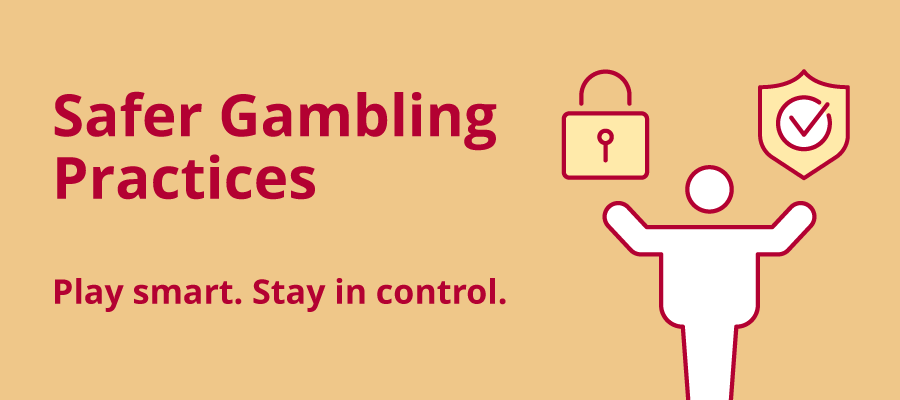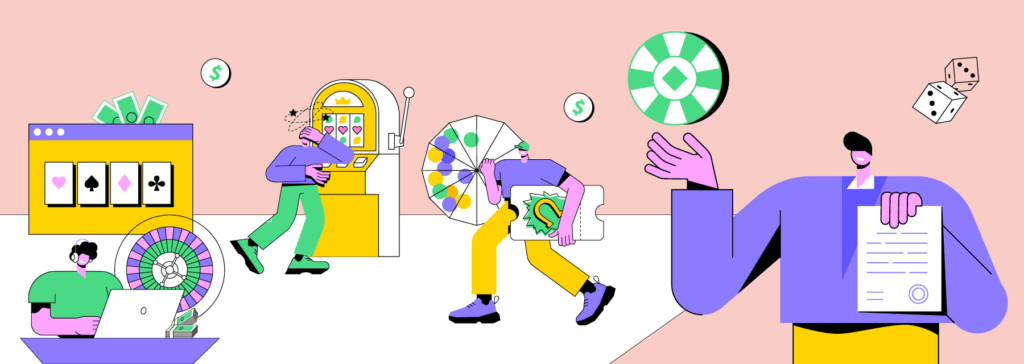Safer Gambling
Encouraging safer online gaming so entertainment remains safe, balanced, and enjoyable.Safer Gambling is still an activity surrounded by plenty of skepticism; however, nowadays, it is highly regulated. Find out how to keep yourself safe while gambling online.
What Safer Gambling Means
Safer gambling enables players to enjoy online gaming as entertainment while minimizing potential harm. It does not involve any restrictions or criticism, but makes you aware, maintains balance, and utilizes the support tools. This includes both built-in safety features and personal spending limits to ensure gambling remains enjoyable and safe.
And since Safer Gambling is all about the players, we will go into detail about the help available for Indian players, how to recognise if you are experiencing problems, how to help a friend, how to protect minors, and what tools are available to help you set boundaries!
The 7 Key Pillars of Safer Gambling

To help players establish healthy boundaries with their gambling, the best online casinos have adopted several practices aimed at protecting their players.
7 areas of Safer Gambling are deemed of high importance, particularly in the iGaming industry:best
| The 7 Key Pillars of Safer Gambling |
|---|
| Underage gambling prevention |
| Personal data privacy |
| Safe environment |
| Vulnerable players protection |
| Payment security |
| Ethical and responsible marketing |
| Safety checks against criminal activity |
To make sure players have all the support they need, trusted online casinos provide a Safer Gambling page within their platform.
The page is meant as a point of reference and provides a lot of important information, like tips on how to maintain gambling boundaries, signs of problem gambling, information about underage gambling and how to protect minors, tools to help you set limits, a self-assessment questionnaire, and a list of gambling support organizations.
Safer Play Habits (Practical Strategies)
Safer gambling is about enjoying online casinos in a controlled, safe, and balanced way. By adopting a few simple habits, players can protect themselves from overspending, impulsive behaviour, and unhealthy gaming patterns. Here are some practical strategies to help you maintain safer play habits:
1. Set Personal Limits
Decide on your deposit, loss, and time limits before you start playing. Stick to these boundaries, even if you’re on a winning or losing streak.
2. Treat Gambling as Entertainment, Not Income
View casino gaming as a fun activity, not a way to make money. This mindset helps reduce unnecessary pressure and unhealthy expectations.
3. Take Regular Breaks
Continuous play can impair judgement. Step away periodically to stay clear-headed and avoid impulsive decisions.
4. Track Your Spending and Time
Keep an eye on how much you’re depositing, betting, and how long you play. Awareness helps you detect unhealthy patterns early.
5. Never Chase Losses
Trying to win back lost money usually leads to overspending. Accept losses as part of the game and stop when you reach your limit.
6. Use In-Platform Safety Tools
Most licensed casinos offer tools like self-exclusion, cooling-off periods, session reminders, and limit settings. Utilize these features to stay in control.
7. Avoid Gambling Under Stress or Influence
Don’t play when you’re tired, stressed, upset, or under the influence of alcohol or substances. It increases the risk of poor decision-making.
8. Seek Support When Needed
If gambling starts to affect your daily life, finances, or emotions, reach out to trustworthy organisations offering confidential help and guidance.
Limits & Controls (Operator Tools)

These days, online casinos have put together a series of tools to help their players manage their gambling more responsibly. These tools are meant to be used by the players to establish limits for themselves and track their gambling activities to have a clear idea of how much they are spending and how long they are playing. These tools are usually part of the player account, and below we shall take a look at what they consist of and the benefits.
Deposit Limit
The deposit limit is a clever little button that helps you limit the amount of money you can deposit in your account on a daily, weekly, or monthly basis. Once the limit has been reached, you won’t be able to place any more deposits and will have to wait for some time to elapse before you can deposit again. The deposit limit is a great tool to control how much you are spending on gambling, and can be especially handy for those players who already feel they are spending more than they should.
Loss Limit
The loss limit option gives you control over how much you can lose over a specific period. Once the limit is reached, you will be unable to place any more bets, regardless of whether you still have funds in your player’s account. You can start betting again only when the limit has been reset automatically. The loss limit button is a great option to have, especially if you can’t afford to lose too much.
Session Limit
This particular tool focuses on time and helps you decide beforehand how long your sessions are. The limit can be set per session, per day, per week, or per month. Once the time available expires, you will be automatically logged out of your account and can log in again only after a certain amount of time has elapsed. Limiting how much time you can spend gambling is a great way to minimise losses while at the same time dedicating yourself to gambling.
Wagering Limit
The wagering limit helps you set a limit on how much money you can bet. If you feel you are betting more than you should, this tool can help you bring it under control, as once the limit has been reached, the online casino site won’t allow you to place any more bets for a certain time.
Transaction History
Rather than a tool, the transaction history button keeps track of everything that has been going on in your account. The transaction history stores important information about deposits, withdrawals, bets, and results. Players are advised to check out their transaction history regularly for that reality check that will give them a clear picture of where they are with their gambling.
Self Exclusion
Players who are becoming addicted to gambling are always encouraged to take breaks, and one tool to help you do just that is the self-exclusion button. With this option, you can choose to close your account either for some time or indefinitely. Once you reach out to customer care to start the process, even if you give up on temptation, you won’t be able to log into your account or create a new account.
Self-Assessment
The self-assessment consists of a series of statements and questions to help players get a general idea of their gambling profile. Once the assessment is completed, they will be presented with a summary that brings into focus negatively affected parts of their lives and offers advice on which tools in the player’s account could be used for better control.
Time Alert
The time alert is more of a notification system, rather than a button, and it comes up every now and then to remind you of the length of your sessions and if any changes took place in your balance. It is meant to deliver a reality check and remind players to regulate themselves if they are betting too much or playing for too long.
Banking & Payments Safety
It is very important to set financial limits as part of safer gambling. Setting financial boundaries helps you control your spending and keep your winnings safe while playing at one of the best online casinos.
Banking Controls & Payment Safety Tools in India

The majority of Indian users take extra precautions while playing at any online casino. We know that India does not have a unified banking system for gambling-specific blocks like the UK, but several banks now offer spending limits, card blocks, and merchant blocking to manage all transactions responsibly. The banking control allows users to limit high-risk gambling.
| Indian banks that offer spending-control features include: |
|---|
| HDFC Bank ICICI Bank SBI (State Bank of India) Axis Bank Kotak Mahindra Bank Yes Bank IDFC FIRST Bank PhonePe / Paytm / Google Pay |
Separate spending accounts
Try to use a separate account for online gaming to reduce overspending, and this will help you to set clear boundaries.
Withdrawal practices
If you are playing well and you have enough winnings, the best thing is to get yourself out of the game as soon as possible. To get this, you can activate auto-withdraw, avoid reversal windows, and transfer your winnings to a non-gambling account.
Recognising Early Warning Signs
If you want to play it safe in an online game, you should build your gambling habits from day 1. Understand the right time to take a break, set your spending limits, and when you should reach out to support. Here are some signs you should look out for:
- Trying to recover your losses as soon as possible by placing huge or more bets.
- Pushing your own limits more than you planned.
- Taking a loan or using credit cards to keep playing.
- Creating new accounts, UPI IDs, wallets, or cards to continue depositing after reaching a limit.
- Skipping meals, social plans, or work responsibilities because of gambling.
- Lying about how much time or money you are investing in online gambling.
- Feeling irritated or restless when you’re not playing
- Using a work device for gambling
- Feeling like you can’t stop once you start playing
Helping Friends or Family Who May Be Struggling
Acknowledging and helping someone with destructive gambling behavior is not easy, especially if it is a loved one. Knowing the first signs of problem gambling can help you detect the problem early and seek help before things progress to have serious consequences.
The first signs are usually linked to a person’s financial situation, moody and unusual behavior, and they change the way they spend their time.
Understanding Game Risk Levels
In today’s era, most online casino games have safer gameplay and have lower risk levels. But some games carry high risks, and you must recognize the risk of a game before investing a heavy amount.
| Examples of high-risk game features: |
|---|
| Very fast gameplay: If you enter any game with rapid rounds, you may end up losing track of money and time. Auto-spin modes: This speeds up the game by reducing the limits and breaks, making you spend more. Continuous play: It is very important to pause while gambling. If you are continuously playing without taking a break, then it is a red flag. Multiple games at once: Playing on several tabs or screens makes it harder to track spending. 24/7 mobile access: Easy access from anywhere can blur the line between daily life and gaming time. High-volatility slots: These provide bigger but less frequent wins, which may trigger loss-chasing behaviour. |
A quick checklist before you start playing
| Quick checklist |
|---|
| Game speed: Choose slower-paced titles that give you time to think. Bet size: Pick low-stakes games to prevent large losses. Game length: Opt for games with clear session limits or natural breaks. Environment: Avoid playing in isolation; playing around others can help maintain control. |
Using Casino Bonuses Wisely
Casino bonuses always look very attractive, but there are various terms and conditions attached to them. Before you claim any bonus, make sure to double-check the offer, your budget, and comfort level. If you feel confused at any stage while claiming the bonus, it is completely fine to skip that bonus.
Before Taking a Bonus: What to Check
- Time restrictions – Some casino bonuses expire very quickly and have a shorter validity period.
- Wagering rules: Understand how much you must wager before withdrawing.
- Maximum bet limits: You should not exceed the maximum bet limit, as this can make your bonus null.
- Game contribution rates: Slots typically count more than table games.
- Withdrawal caps: Some bonuses have a withdrawal cap; check the limit before you cash out.
- Payment method restrictions: Certain offers may exclude UPI apps, wallets, or specific payment methods.
- Fund order: Check whether your real money or bonus money is used first.
While Using the Bonus
- Avoid depositing more money just to fulfill the wagering requirements.
- Stay within the max-bet limit bracket.
- Stick to eligible games to avoid wasting time.
After You Finish
If you meet the wagering requirement, try to withdraw your winnings immediately and take a minimum pause of 72 hours before playing again.
Avoid bonuses with:
- Wagering on both the deposit + bonus
- Very low max bets
- Short completion windows (such as ≤ 24 hours)
- Very low withdrawal limits
- Excluded payment methods you regularly use
Support & Assistance for Indian Players
Gambling addiction can be a great problem that might have negative consequences both on the gambler and their loved ones.
These days, there are a number of non-profit, independent organizations that offer professional services like counseling, debt advice, forums, support groups, and helpful information.
Indian players can reach out to various gambling support organizations, and below we have listed some agencies that have an excellent reputation for helping players break out of an addiction.
Tele-MANAS
Tele-MANAS is a national mental health support helpline launched by the Government of India to provide free and confidential health services. The helpline further offers mental support, emergency support, and guidance for individuals dealing with stress, anxiety, depression, and addiction-related concerns, including gambling-related harm.
Services Offered:
- 24/7 emotional health helpline support
- Emergency counseling and emotional support
- Support for addiction-related issues
Contact Information:
Website: www.telemanas.mohfw.gov.in
Phone: 14416 / 1-800-891-4416
Email: [email protected]
iCALL
iCALL is a famous mental health helpline operated by the Tata Institute of Social Sciences (TISS). It also offers confidential counseling like Tele Manas and psychological support for individuals facing emotional distress, relationship issues, behavioural addictions, and mental health challenges, including concerns related to gambling behaviour.
Services Offered:
- Telephone and email-based counseling
- Support for behavioural addictions
- Referral to local mental health professionals
Contact Information:
Website: www.icall.tiss.edu
Phone: +91 91529 87821
Email: [email protected]
Hope Trust
Hope Trust is one of India’s leading rehabilitation and mental health organisations, based in Hyderabad. It is internationally accredited and well-known for treating a wide range of addictions, including gambling addiction. The centre provides residential rehabilitation programs, individual therapy, group counseling, family support, and relapse prevention strategies.
Services Offered:
- Inpatient and outpatient rehabilitation
- Specialised addiction recovery programs
- Counseling for gamblers and their families
Contact Information:
- Website: www.hopetrustindia.com
- Phone: +91-98490 17777 / +91-40-2980 1777
- Email: [email protected]
AASRA (Suicide Prevention & Mental Health Support)
AASRA is a well-known NGO in India dedicated to emotional support and suicide prevention. It provides a safe, confidential space for individuals struggling with stress, depression, or addictive behaviours, including gambling.
- Helpline (24/7): +91-9820466726
- Helpline (Landline): +91-22-27546669 / +91-22-27546667
- Website: www.aasra.info
Gambling Therapy (International, Online Access for Indians)
Although based outside India, Gambling Therapy provides 24/7 multilingual online support that Indian players can access anytime. Services include live chat, online support groups, forums, and self-help resources.
- Website: www.gamblingtherapy.org
Why Reaching Out Matters
Addiction is not a sign of weakness—it’s a medical and psychological condition. By contacting one of these organizations, players and families can:
- Speak to trained counsellors confidentially.
- Access therapy, group support, and rehabilitation programs.
- Get advice on managing debt and rebuilding financial stability.
- Find hope and recovery through professional help.
Helpful Resources:
- https://www.helpguide.org/mental-health/addiction/gambling-addiction-and-problem-gambling
- https://kmb.camh.ca/ggtu/
- https://www.leosafeplay.com/our-tools/
